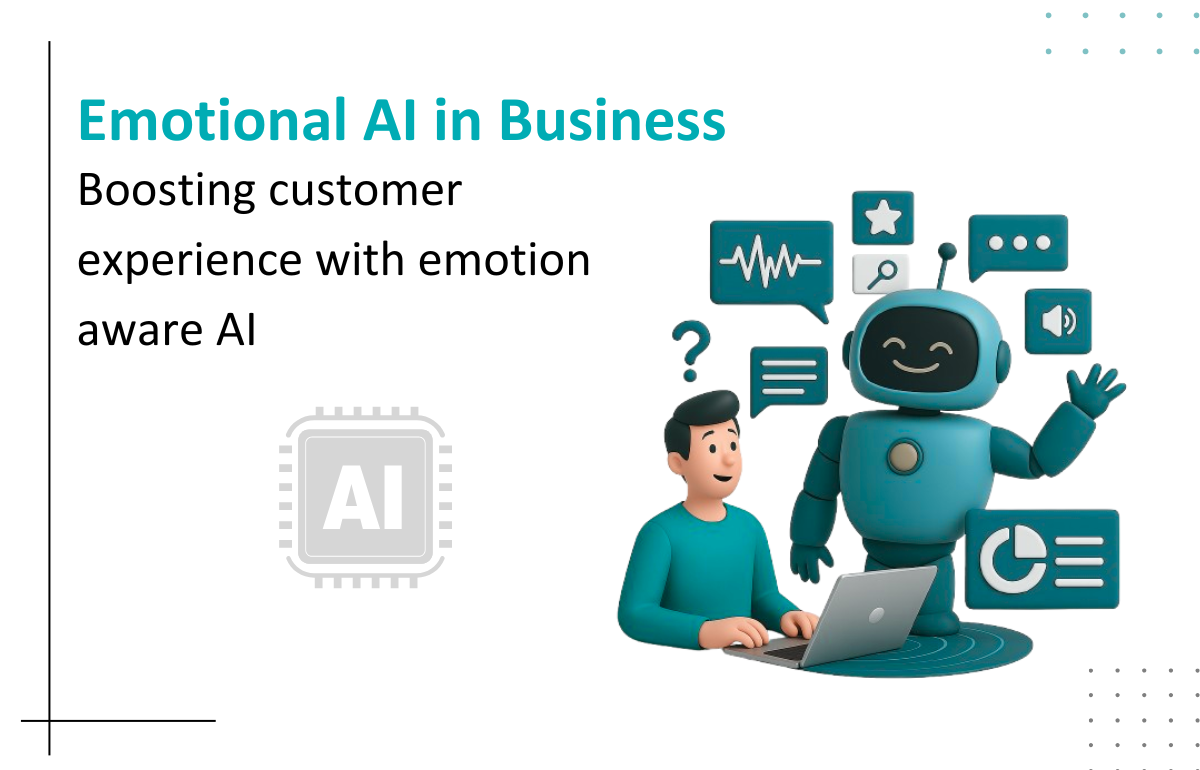Emotional AI: A New Frontier for Business
Emotional AI is a type of artificial intelligence that can understand and respond to human emotions. By analyzing facial expressions, voice tone, and other cues, it can identify emotions like happiness, sadness, anger, fear, and surprise.
This technology has the potential to revolutionize businesses by:
- Improving customer experiences: Personalizing interactions and addressing emotional needs.
- Enhancing employee engagement: Creating a more supportive and motivating work environment.
- Informing data-driven decisions: Providing insights into customer sentiment and behavior.
- Opening up new market opportunities: Developing products and services that cater to emotional needs
To effectively implement Emotional AI, leveraging Natural Language Processing (NLP) is essential. For insights on choosing the right NLP tool for your business, check out our blog on NLTK vs spaCy: A Deeper Dive into NLP Libraries, where we explore the capabilities of these two powerful libraries.
However, it's essential to consider ethical implications such as privacy and bias.
The Benefits of Emotional AI
Improved Customer Experience
- Personalized Interactions: Emotional AI tailors interactions based on customers' emotional states, enhancing engagement.
- Enhanced Satisfaction and Loyalty: By responding to customer emotions, businesses boost satisfaction and loyalty.
- Proactive Problem-Solving: Emotional AI detects potential issues early, enabling timely and effective solutions.
Increased Employee Engagement
- Reduced Stress and Improved Well-being: Emotional AI identifies and addresses employee stress, enhancing overall well-being.
- Tailored Training and Development: By understanding emotions, businesses can offer personalized training programs.
- Positive Work Culture: Emotional AI fosters a supportive work environment by promoting empathy and understanding.
Enhanced Decision Making
- Data-Driven Insights: Provides valuable insights into customer sentiment, aiding data-driven decisions.
- Reduced Bias: Helps identify and reduce biases in decision-making.
- Optimized Resource Allocation: Improves resource allocation by understanding customer preferences and priorities.
Real-World Applications of Emotional AI
Customer Service
- Chatbots and Virtual Assistants: Offer empathetic, personalized support, improving satisfaction and response times.
- Sentiment Analysis: Identifies improvement areas and tailors offerings based on customer feedback.
Human Resources
- Hiring: Evaluates candidates' emotional intelligence and cultural fit for better hires.
- Training and Development: Customizes training to enhance engagement.
- Employee Well-being: Monitors stress and supports mental health.
Marketing
- Targeted Advertising: Creates effective ads by understanding customer emotions.
- Personalized Recommendations: Suggests products based on emotional and behavioral data.
- Market Research: Provides deeper insights into customer sentiment.
Healthcare
- Mental Health Support: Uses tools and chatbots for therapy and stress management.
- Patient Engagement: Improves engagement and adherence by understanding patient emotions.
- Drug Discovery: Analyzes data to identify potential drug targets.
Implementing Emotional AI in Your Business
Start by identifying where emotional AI will have the greatest impact, such as enhancing customer experience through personalized interactions, boosting employee engagement for better productivity, and supporting data-driven decision-making.
Next, choose the right emotional AI technology. Ensure it meets your needs, accurately detects emotions, scales with your business, integrates well with existing systems, and follows ethical practices.
Collect and analyze relevant data, including customer feedback, employee surveys, and behavioral data like facial expressions and voice tone.
Finally, develop a strategy with clear goals, key performance indicators (KPIs), ethical guidelines, and a detailed implementation plan outlining steps, timelines, and resources.
By following these steps, you can effectively integrate emotional AI into your business and harness its benefits.
End Note
Emotional AI holds transformative potential for various industries by enhancing customer experiences, improving employee engagement, and supporting data-driven decision-making. Key benefits include personalized interactions, better customer satisfaction, improved employee well-being, and valuable insights for decision-making.
However, challenges such as privacy concerns, ethical issues, and technical limitations must be addressed. Businesses that adopt emotional AI early will be better positioned to leverage its advantages and drive innovation. By understanding its potential and addressing its challenges, companies can unlock new opportunities and stay ahead in their industries.

